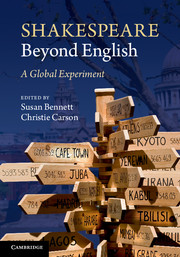Book contents
- Frontmatter
- Contents
- List of Illustrations
- List of colour plates
- Notes on contributors
- Foreword
- Acknowledgements
- Introduction
- The Globe to Globe Festival: An Introduction
- Performance Calendar
- Week One
- Week Two
- Chapter Seven Performing cultural exchange in Richard III
- Chapter Eight ‘A girdle round about the earth’
- Chapter Nine Intercultural Rhythm in Yohangza's Dream
- Chapter Ten Art of darkness
- Chapter Eleven Neo-liberal Pleasure, Global Responsibility and the South Sudan Cymbeline
- Chapter Twelve Titus in No Man's Land
- Chapter Thirteen Tang Shu-wing's Titus and the acting of violence
- Chapter Fourteen ‘A strange brooch in this all-hating world’
- Chapter Fifteen ‘We want Bolingbroke’
- Chapter Sixteen O-thell-O
- Week Three
- Week Four
- Week Five
- Week Six
- Afterwords
- Index
- Plate section
Chapter Seven - Performing cultural exchange in Richard III
Intercultural display and personal reflections
Published online by Cambridge University Press: 05 June 2014
- Frontmatter
- Contents
- List of Illustrations
- List of colour plates
- Notes on contributors
- Foreword
- Acknowledgements
- Introduction
- The Globe to Globe Festival: An Introduction
- Performance Calendar
- Week One
- Week Two
- Chapter Seven Performing cultural exchange in Richard III
- Chapter Eight ‘A girdle round about the earth’
- Chapter Nine Intercultural Rhythm in Yohangza's Dream
- Chapter Ten Art of darkness
- Chapter Eleven Neo-liberal Pleasure, Global Responsibility and the South Sudan Cymbeline
- Chapter Twelve Titus in No Man's Land
- Chapter Thirteen Tang Shu-wing's Titus and the acting of violence
- Chapter Fourteen ‘A strange brooch in this all-hating world’
- Chapter Fifteen ‘We want Bolingbroke’
- Chapter Sixteen O-thell-O
- Week Three
- Week Four
- Week Five
- Week Six
- Afterwords
- Index
- Plate section
Summary
At the end of the National Theatre of China's (NTC) first performance of Richard III on the afternoon of 28 April 2012 at the Globe to Globe Festival, when the actors took the curtain call with a traditional Chinese bow – something they don't usually do when performing in China – the audience could feel in the actors a release of tension as well as an overwhelming sense of pride and fulfilment. The actors must have felt they were representing China in a ‘Shakespeare Olympics’, but the production's set and costumes had yet to arrive and they had had to perform in hastily put-together stand-ins. Nevertheless, the virtuosity of their craft held the audience rapt throughout the performance.
Theatre critics from the Chinese media had been invited to a special preview on 14 March 2012, before the set and costumes were shipped to London. Press publicity materials released for the occasion highlighted the fact that the production had been specially created for the Globe to Globe Festival to ‘bring Chinese culture out to meet with the world's different races, different languages, and different cultural backgrounds, to interact and communicate with one another under the banner of Shakespeare’. In an interview with Phoenix TV in China, Wang Xiao Ying, director of the production, recalled looking through posters of other participating productions and noticing that most would be dressing their characters in ethnic costumes. So Wang decided on classical Chinese costume for his production, especially to add elements of classical Chinese culture. From the initial stage of conceptualization, Wang invested the production with Chinese cultural symbols that he felt would most effectively achieve the goal of cultural exchange. This was important to him in the context of the Festival's association with the London Olympics, and the fact that his Richard III would be performed on Shakespeare's ‘home ground’ together with productions in thirty-six other languages.
- Type
- Chapter
- Information
- Shakespeare beyond EnglishA Global Experiment, pp. 75 - 82Publisher: Cambridge University PressPrint publication year: 2013

